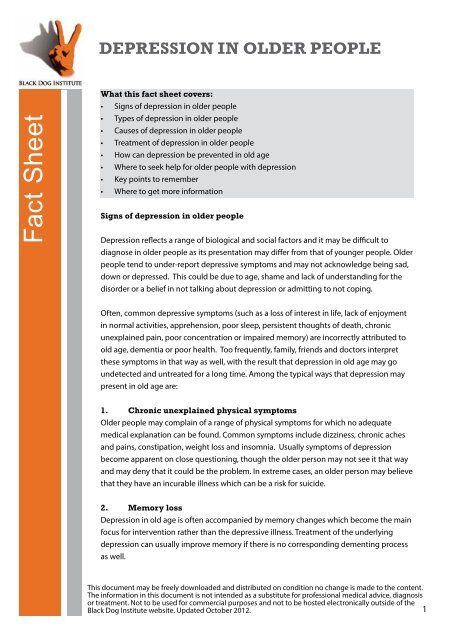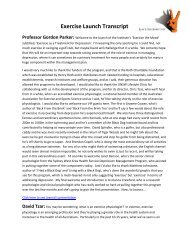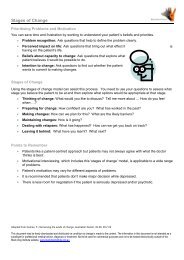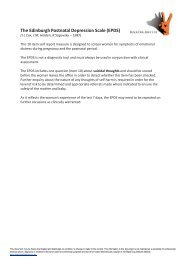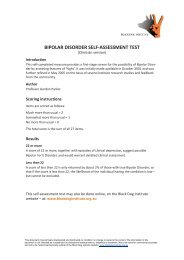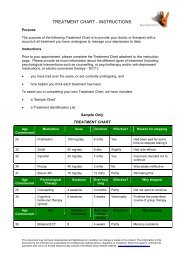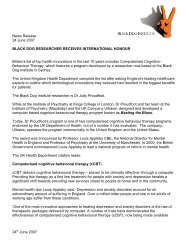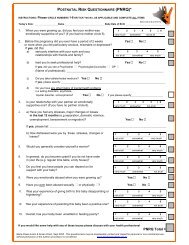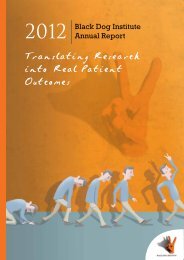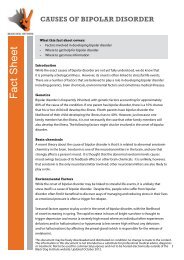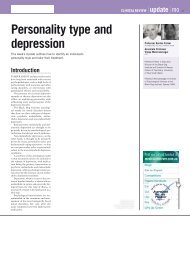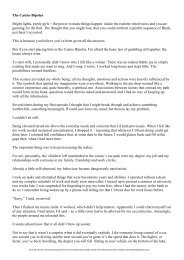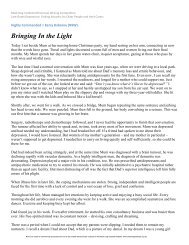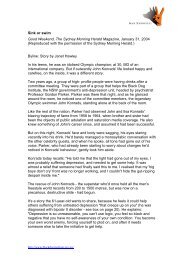Fact Sheet: Depression In Older People - Black Dog Institute
Fact Sheet: Depression In Older People - Black Dog Institute
Fact Sheet: Depression In Older People - Black Dog Institute
Create successful ePaper yourself
Turn your PDF publications into a flip-book with our unique Google optimized e-Paper software.
<strong>Depression</strong> in older people<br />
<strong>Fact</strong> <strong>Sheet</strong><br />
What this fact sheet covers:<br />
• Signs of depression in older people<br />
• Types of depression in older people<br />
• Causes of depression in older people<br />
• Treatment of depression in older people<br />
• How can depression be prevented in old age<br />
• Where to seek help for older people with depression<br />
• Key points to remember<br />
• Where to get more information<br />
Signs of depression in older people<br />
<strong>Depression</strong> reflects a range of biological and social factors and it may be difficult to<br />
diagnose in older people as its presentation may differ from that of younger people. <strong>Older</strong><br />
people tend to under-report depressive symptoms and may not acknowledge being sad,<br />
down or depressed. This could be due to age, shame and lack of understanding for the<br />
disorder or a belief in not talking about depression or admitting to not coping.<br />
Often, common depressive symptoms (such as a loss of interest in life, lack of enjoyment<br />
in normal activities, apprehension, poor sleep, persistent thoughts of death, chronic<br />
unexplained pain, poor concentration or impaired memory) are incorrectly attributed to<br />
old age, dementia or poor health. Too frequently, family, friends and doctors interpret<br />
these symptoms in that way as well, with the result that depression in old age may go<br />
undetected and untreated for a long time. Among the typical ways that depression may<br />
present in old age are:<br />
1. Chronic unexplained physical symptoms<br />
<strong>Older</strong> people may complain of a range of physical symptoms for which no adequate<br />
medical explanation can be found. Common symptoms include dizziness, chronic aches<br />
and pains, constipation, weight loss and insomnia. Usually symptoms of depression<br />
become apparent on close questioning, though the older person may not see it that way<br />
and may deny that it could be the problem. <strong>In</strong> extreme cases, an older person may believe<br />
that they have an incurable illness which can be a risk for suicide.<br />
2. Memory loss<br />
<strong>Depression</strong> in old age is often accompanied by memory changes which become the main<br />
focus for intervention rather than the depressive illness. Treatment of the underlying<br />
depression can usually improve memory if there is no corresponding dementing process<br />
as well.<br />
This document may be freely downloaded and distributed on condition no change is made to the content.<br />
The information in this document is not intended as a substitute for professional medical advice, diagnosis<br />
or treatment. Not to be used for commercial purposes and not to be hosted electronically outside of the<br />
<strong>Black</strong> <strong>Dog</strong> <strong>In</strong>stitute website. Updated October 2012.<br />
1
<strong>Depression</strong> in older people<br />
<strong>Fact</strong> <strong>Sheet</strong><br />
3. Behavioural changes<br />
These can be quite varied and can include:<br />
• Avoidance of leaving the home, refusal to eat, shoplifting, hoarding behaviours or<br />
alcohol abuse<br />
• Preoccupations with changing their will, giving away personal possessions, talking<br />
about death, or taking an unprecedented interest in firearms<br />
These behaviours should not only alert friends and family to the possibility of depression,<br />
but also to the risk of suicide<br />
Types of depression in older people<br />
The most common type of depression in older age is non-melancholic depression which<br />
is linked to psychological factors, personality characteristics and stressful life events.<br />
However, when there is a history of depression in earlier life, it is likely that genetic factors<br />
may contribute to the course of the depressive illness.<br />
<strong>Depression</strong> that first develops in later life, usually after age 60, is more commonly<br />
associated with physical health problems that accompany ageing. An older person in<br />
good physical health with no history of previous episodes has a relatively low risk of<br />
developing depression at a later age.<br />
Causes of depression in older people<br />
1. Physical ill health<br />
There is a complex relationship between physical illness, disability and depression. Many<br />
physical illnesses also cause depression through a variety of biological mechanisms.<br />
Physical illnesses that can cause depression in old age include cancer, thyroid disease,<br />
vitamin deficiencies and infections. There is also mounting evidence that cerebrovascular<br />
disease is an important risk factor for late life depression. So it is essential that any older<br />
person who becomes depressed for the first time in old age has a thorough medical<br />
evaluation.<br />
Many physical illnesses in old age result in permanent disabilities which can restrict a<br />
person’s mobility and often require assistance with self-care. This may result in loss of<br />
dignity, a sense of being a burden on others and fears of institutionalisation.<br />
Finally, medications that are required to treat many physical problems are associated with<br />
depression; particularly drugs used to treat high blood pressure, and steroids, painkillers<br />
and tranquillisers.<br />
This document may be freely downloaded and distributed on condition no change is made to the content.<br />
The information in this document is not intended as a substitute for professional medical advice, diagnosis<br />
or treatment. Not to be used for commercial purposes and not to be hosted electronically outside of the<br />
<strong>Black</strong> <strong>Dog</strong> <strong>In</strong>stitute website. Updated October 2012.<br />
2
<strong>Depression</strong> in older people<br />
<strong>Fact</strong> <strong>Sheet</strong><br />
2. Social isolation and loneliness<br />
Many people experience social isolation and loneliness in old age, either as a result of living<br />
alone, a lack of close family ties, reduced connections with their culture of origin, or an<br />
inability (often through lack of transport) to actively participate in the local community.<br />
When this occurs in combination with physical disablement, demoralisation and<br />
depression are common.<br />
3. Loss in old age<br />
Symbolic and real losses are the psychological basis of many depressions. Old age<br />
represents a period of life where losses are cumulative and frequent. Many elderly people<br />
cope well with losses such as the death of their partner, siblings, friends and pets, and the<br />
loss of independence, health, home and lifestyle. However, for other people, these losses can<br />
trigger the development of depressive symptoms.<br />
Treatment of depression in older people<br />
There are a range of treatments available to treat older people:<br />
• For more severe depression, antidepressant medication is usually required.<br />
Antidepressant medication may take longer to work in older people, so trials of at least<br />
six to eight weeks may be required<br />
• Electroconvulsive therapy (ECT) is a useful treatment in melancholic and psychotic<br />
depression when individuals have failed to respond to medication, or when the<br />
depression is very severe<br />
• <strong>In</strong> the non-melancholic depressions, the usual range of psychotherapies is applicable,<br />
though therapists need to take into account the limitations imposed by poor hearing,<br />
poor eyesight and physical discomfort<br />
Other helpful treatments for depression include social activities, physical exercise and music<br />
therapy. See our <strong>Fact</strong> <strong>Sheet</strong> Treatments for <strong>Depression</strong>.<br />
How can depression be prevented in old age?<br />
Lifestyle changes in mid-life may be the key to the prevention of depression in old age. As<br />
mentioned earlier, there is mounting evidence that cerebrovascular disease may be linked<br />
to depression in old age, so controlling the known risk factors for vascular disease may also<br />
prevent depression.<br />
These include:<br />
• reduction of high blood pressure<br />
• cessation of cigarette smoking<br />
• reduction of cholesterol and lipid levels<br />
This document may be freely downloaded and distributed on condition no change is made to the content.<br />
The information in this document is not intended as a substitute for professional medical advice, diagnosis<br />
or treatment. Not to be used for commercial purposes and not to be hosted electronically outside of the<br />
<strong>Black</strong> <strong>Dog</strong> <strong>In</strong>stitute website. Updated October 2012.<br />
3
<strong>Depression</strong> in older people<br />
<strong>Fact</strong> <strong>Sheet</strong><br />
• increased physical exercise: See our <strong>Fact</strong> <strong>Sheet</strong> Managing depression with exercise<br />
• weight control<br />
• a diet rich in fish, grains and greens<br />
Other ways to reduce the risk of depression include mental stimulation, social activities and<br />
control of chronic pain.<br />
Where to seek help for older people with depression<br />
• Family GP is the best first port of call for anyone over 65 who is experiencing depression<br />
• It may also be helpful to seek out a psychiatrist who specialises in geriatric care (a<br />
psychogeriatrician)<br />
Key points to remember<br />
• <strong>Depression</strong> in adults over 65 years is sometimes difficult to recognise, as the symptoms<br />
are often similar to the problems of ageing<br />
• Features can include unexplained physical symptoms, memory loss and various<br />
behavioural changes<br />
• It is important to address related factors that may be contributing to lowered mood states<br />
(i.e. psychosocial problems, loneliness and isolation) however, clinical depression in an<br />
older person must be treated separately to issues of ageing<br />
• <strong>Older</strong> age does not diminish the effectiveness of treatments. Improvement and recovery<br />
is possible with the right treatment and management strategies<br />
• As with treating any depression, the most effective treatments should factor in specific<br />
features, causes and stressful life-events for that individual<br />
Where to get more information<br />
• www.seniors.gov.au is the Australian Government’s premier source of information for<br />
Australians over 50<br />
• Recommended Reading: Managing <strong>Depression</strong> Growing <strong>Older</strong>: a guide for<br />
professionals & carers, Kerrie Eyers, Gordon Parker & Henry Brodaty (2012) Allen & Unwin<br />
<strong>Black</strong> <strong>Dog</strong> <strong>In</strong>stitute<br />
Hospital Road, Prince of Wales Hospital, Randwick NSW 2031<br />
(02) 9382 4530 Email: blackdog@blackdog.org.au<br />
www.blackdoginstitute.org.au<br />
This document may be freely downloaded and distributed on condition no change is made to the content.<br />
The information in this document is not intended as a substitute for professional medical advice, diagnosis<br />
or treatment. Not to be used for commercial purposes and not to be hosted electronically outside of the<br />
<strong>Black</strong> <strong>Dog</strong> <strong>In</strong>stitute website. Updated October 2012.<br />
4


